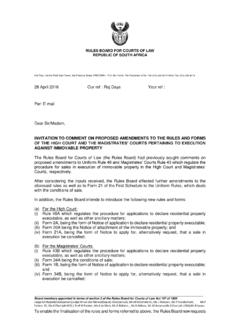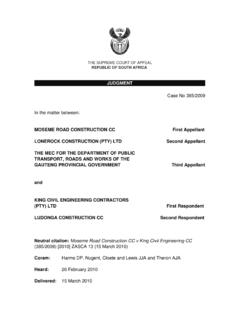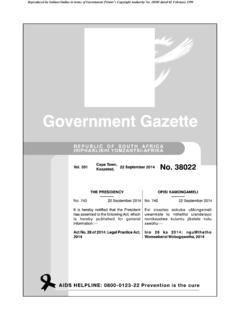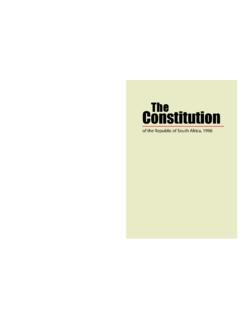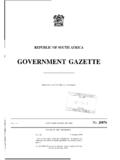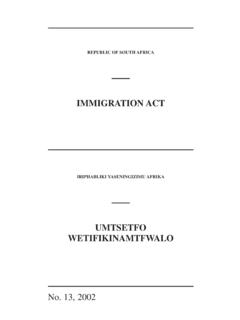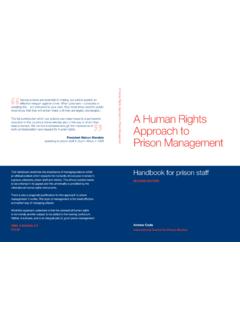Transcription of RULES BOARD FOR COURTS OF LAW ACT 107 OF 1985
1 RULES BOARD FOR COURTS OF LAW ACT 107 OF 1985 [ASSENTED TO 10 JULY 1985] [DATE OF COMMENCEMENT: 20 FEBRUARY 1987] (Afrikaans text signed by the State President) ACT To provide for the making of RULES for the efficient, expeditious and uniform administration of justice in the Supreme court of Appeal, High COURTS and lower COURTS ; for that purpose to make provision for the establishment of the RULES BOARD for COURTS of Law; and to provide for matters connected therewith. 1 Definitions In this Act, unless the context indicates otherwise- 'Appellate Division'.. [Definition of 'Appellate Division' deleted by s. 1 (a) of Act 77 of 1989.] ' BOARD ' means the RULES BOARD for COURTS of Law established by section 2; 'clerk of the court ' means a person appointed as such in terms of section 13 (1) of the Magistrates' COURTS Act, 1944 (Act 32 of 1944); 'commissioner' means a commissioner referred to in section 32 of the Supreme court Act, 1959 (Act 59 of 1959); 'committee' means a committee of the BOARD established under section 5 (1); 'lower court ' means a court of a regional division and a magistrate's court established in terms of the Magistrates' COURTS Act, 1944 (Act 32 of 1944), and 'lower COURTS ' has a corresponding meaning; 'Minister' means the Minister of Justice.
2 'registrar' means a person appointed as such under section 34 (1) of the Supreme court Act, 1959 (Act 59 of 1959); 2'Supreme court ' .. [Definition of 'Supreme court ' substituted by s. 1 (b) of Act 77 of 1989 and deleted by s. 21 of Act 62 of 2000.] 2 Establishment of RULES BOARD for COURTS of Law There is hereby established a BOARD called the RULES BOARD for COURTS of Law and having the powers and duties conferred or imposed upon it by this Act or any other law. 3 Constitution of BOARD and period of office of members (1) The BOARD shall consist of the following members appointed by the Minister, namely- (a) a judge of the Constitutional court , the Supreme court of Appeal or a High court , whom the Minister designates as the chairperson; (b) a judge or retired judge of the Constitutional court , the Supreme court of Appeal or a High court , whom the Minister designates as the vice-chairperson; (c) a magistrate appointed under section 9 (1) (a) of the Magistrates' COURTS Act, 1944 (Act 32 of 1944); (d) two practising advocates, after consultation with the General Council of the Bar of South Africa.
3 (e) two practising attorneys, after consultation with the Association of Law Societies of the Republic of South Africa; (f) a lecturer in law at a university in the Republic; (g) an officer of the Department of Justice; (h) not more than three persons who, in the opinion of the Minister, have the necessary expertise to serve as members of the BOARD . (1A) The Minister may in respect of a member referred to in paragraph (d) or (e) of subsection (1) appoint a practising advocate or practising 3attorney, as the case may be, as an alternate member after consultation as required by the paragraph in question has taken place, to act during the absence from any meeting of the BOARD of the member in respect of whom he or she is so appointed, in the place of that member.
4 (2) A member of the BOARD shall be appointed for a period of not more than five years, and any such appointment may be terminated at any time by the Minister if in his or her opinion there are sound reasons for doing so. (3) Any person whose period of office as a member of the BOARD has expired, may be reappointed. 4 Meetings of BOARD (1) Meetings of the BOARD shall be held at the times and places determined by the chairperson or, if he or she is not available, by the vice-chairperson of the BOARD . (2) The majority of the members of the BOARD shall constitute a quorum for a meeting. (3) If the chairperson is absent from a meeting, the vice-chairperson shall act as chairperson, and if both the chairperson and the vice-chairperson are absent, the members present shall elect one of their number to preside at that meeting.
5 (4) The BOARD may regulate the proceedings at its meetings as it may think fit and shall cause minutes to be kept of the proceedings. 5 Committees of BOARD (1) The Minister or the BOARD may establish committees consisting of such members of the BOARD as may be designated by the BOARD and such other persons, as if any, as the Minister may appoint for that purpose and for the period determined by him or her. 4(2) The Minister may at any time extend the period of any appointment made by him or her under subsection (1) or, if in his or her opinion there are sound reasons for doing so, terminate such appointment. (3) The BOARD shall designate a chairperson for every committee and, if the BOARD deems it necessary, a vice-chairperson.
6 (4) A committee shall, subject to the directions of the BOARD , perform such functions of the BOARD as either the Minister or the BOARD may assign to it. (5) On completion of all functions assigned to it in terms of subsection (4), a committee shall submit a full report thereon to the BOARD , whereupon the committee shall automatically dissolve. (6) The Minister or the BOARD may at any time dissolve any committee. (7) The provisions of section 4 shall mutatis mutandis apply to meetings of a committee. 5A Executive committee (1) The BOARD may appoint an executive committee of the BOARD consisting of the chairperson, the vice-chairperson and such other members of the BOARD as may be determined by the BOARD . (2) The chairperson of the BOARD shall be the chairperson of the executive committee.
7 (3) The executive committee may with regard to any matter referred to in paragraphs (a) to (t), inclusive, of subsection (1) of section 6, read with subsections (7) and (8) of that section, or any other matter entrusted to the BOARD , formulate and adopt a draft resolution, which shall become a decision of the BOARD when a document setting out that draft resolution has been submitted to all members of the BOARD and has been approved by the majority of such members. (4) The Minister may in his or her discretion determine any matter which shall not be dealt with under this section. 56 Powers of BOARD (1) The BOARD may, with a view to the efficient, expeditious and uniform administration of justice in the Supreme court of Appeal, the High COURTS and the lower COURTS , from time to time on a regular basis review existing RULES of court and, subject to the approval of the Minister, make, amend or repeal RULES for the Supreme court of Appeal, the High COURTS and the lower COURTS regulating- (a) the practice and procedure in connection with litigation, including the time within which and the manner in which appeal shall be noted; (b) the form, contents and use of process.
8 (c) the practice and procedure in connection with the service of process or other documents, including the issue of interrogatories; (d) the practice and procedure in connection with the execution of process, including writs and warrants; (e) the practice and procedure in connection with the reference of any matter to a referee under section 19 of the Supreme court Act, 1959 (Act 59 of 1959), and the remuneration payable to any such referee; (f) the compulsory examination by one or more registered medical practitioners of any party to proceedings in which damages or compensation in respect of alleged bodily injury is claimed and whose state of health is relevant for the determination of such damages or compensation, as well as the manner, time, place and responsibility for the cost of the examination, and the making available to the opposing party of any documentary report on the examination; (g) the procedure at or in connection with any enquiry as to the mental state of any person, and the findings or orders which may be made or issued at any such enquiry.
9 6 (h) the appointment and admission of commissioners to take evidence and examine witnesses; (i) the manner in which documents executed outside the Republic may be authenticated to permit of their being produced or used in any court or produced or lodged in any public office in the Republic; (j) the appointment and admission of sworn translators; (k) the duties of sheriffs and other officers of court ; (l) fees and costs, including the fees payable in respect of the service or execution of process (except subpoenas or warrants issued at the request of the State in criminal matters) or in respect of the summoning of persons to answer interrogatories; (m) the manner of determining the amount of security in any case where it is required that security shall be given, and the form and manner in which such security may be given; (n) the hours during which the offices of registrars and clerks of the court shall be open for official purposes; (o) the manner or recording or noting evidence and proceedings; (p) the custody and disposal of records or minutes of evidence and proceedings in the Supreme court of Appeal and the High COURTS ; (q) the appointment of assessors in proceedings in lower COURTS ; (r) the tariff of fees chargeable by advocates, attorneys and notaries; (s) the taxation of bills of costs and the recovery of costs.
10 (t) generally any matter which may be necessary or useful to be prescribed for the proper despatch and conduct of the functions of the Supreme court of Appeal, the High COURTS and the lower COURTS in civil as well as in criminal proceedings. 7(2) (a) Different RULES may be made in respect of the Supreme court of Appeal, the High COURTS and the lower COURTS and in respect of different kinds of proceedings. (b) The BOARD may, with the approval of the Minister, make different RULES in respect of- (i) the Supreme court of Appeal and the High COURTS ; (ii) the different High COURTS ; or (iii) the lower COURTS in different magisterial districts, which shall be of force for the period or periods determined by the BOARD . (3) RULES made under any provision of a law repealed by this Act and in force at the commencement of this Act, shall, subject to the provisions of this Act and notwithstanding the repeal of that provision by section 10 or 11 of this Act, remain in force until amended or repealed under this section.










